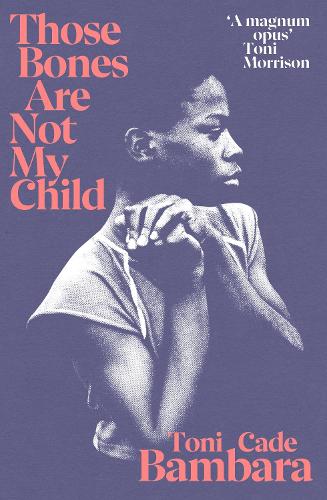
Those Bones Are Not My Child
(Paperback)
Available Formats
Publishing Details
Those Bones Are Not My Child
By (Author) Toni Cade Bambara
Vintage Publishing
Vintage Classics
5th January 2022
7th October 2021
United Kingdom
Classifications
General
Fiction
Historical fiction
Narrative theme: death, grief, loss
Family saga / generational saga fiction
Narrative theme: politics / economics
Narrative theme: social issues / social problems
813.54
Physical Properties
Paperback
688
Width 129mm, Height 198mm, Spine 34mm
495g
Description
A suspenseful, epic novel portraying a community-and a family-under siege, during the shocking string of murders of black children in Atlanta in the early 1980s. 'A magnum opus... Puts the reader at the heart of the horror that came to be called the Atlanta child murders' Toni Morrison Zala Spencer is barely surviving on the margins of Atlanta's booming economy when she awakens one summer's morning in 1980 to find her teenage son, Sonny, has disappeared. As uneasy hours turn into desperate days, Zala realizes that Sonny is among the many cases of missing children beginning to attract national attention. Growing increasingly disillusioned with the authorities, who respond to Sonny's disappearance with cold indifference, Zala and her estranged husband embark on an epic search. Through the eyes of a family seized by anguish and terror, we watch a city roiling with political, racial, and class tensions. Written over a span of twelve years, and edited by Toni Morrison, who called Those Bones Are Not My Child the author's magnum opus, Toni Cade Bambara's last novel leaves us with an enduring and revelatory chronicle of an American nightmare.
Reviews
A magnum opus... Puts the reader at the heart of the horror that came to be called the Atlanta child murders -- Toni Morrison
A full-bloodied, important book and an eloquent final testament of a writer whose art was always dictated to by her humanity and sense of justice -- Eileen Battersby * Irish Times *
These Bones Are Not My Child isn't just a gripping thriller; it's a masterwork of American literature * Harper's Bazaar *
Bambara has produced both a human drama and a steely report on contemporary society. . .admirable * The Times *
Bambara's achievement - in this masterly work - is to voice this sense of loss, to give full human dimension to events that for too long many of us flashed by like billboards at highway speed * New York Times Book Review *
Captures for all time a nightmare of private hate and public racism * Independent on Sunday *
A woolly mammoth of a novel, truly worthy of being called an epic, a book with great big feet that sometimes take ponderous steps but that always hit the ground with the sound of thunder * Chicago Tribune *
Riveting... A carefully crafted mystery [that is] difficult to put down * Boston Globe *
Toni Cade Bambara's writing is so great it lifts you off the ground * New Statesman *
Nobody writes with her breathtaking humor, empathy, ferocity, and surrealness... As a writer, her observation and humanity are timeless. As a reader, I release myself into Ms. Toni's sure and steady hands, knowing every part of me will be illuminated by her gaze -- Adjoa Andoh
Author Bio
Author, teacher, activist and filmmaker Toni Cade Bambara was born in Harlem, New York in 1939. After graduating from Queens College in 1959, she worked as a social investigator, and then in the psychiatry department of New York City's Metropolitan Hospital. She studied acting and mime in Florence and Paris, received an MA in 1964 from City College of New York, and went on to lecture in English at CUNY, Livingston College, and other universities. Bambara's involvement in the Black liberation and women's movements led her to edit and publish one of the first major anthologies of Black women's writing, The Black Woman, in 1970; the following year she published a collection of folktales, Tales and Stories for Black Folks, which celebrated what she dubbed 'Our Great Kitchen Tradition'. In 1972, Bambara published her debut collection of short stories, Gorilla, My Love, and then, in 1980, her first novel, The Salt Eaters, which won the American Book Award and the Langston Hughes Society Award. Upon her death in 1995, The New York Times praised Bambara as 'a major contributor to the emerging genre of contemporary black women's literature'. Her legacy was recognised with a posthumous induction into the Georgia Writers Hall of Fame in 2013.
